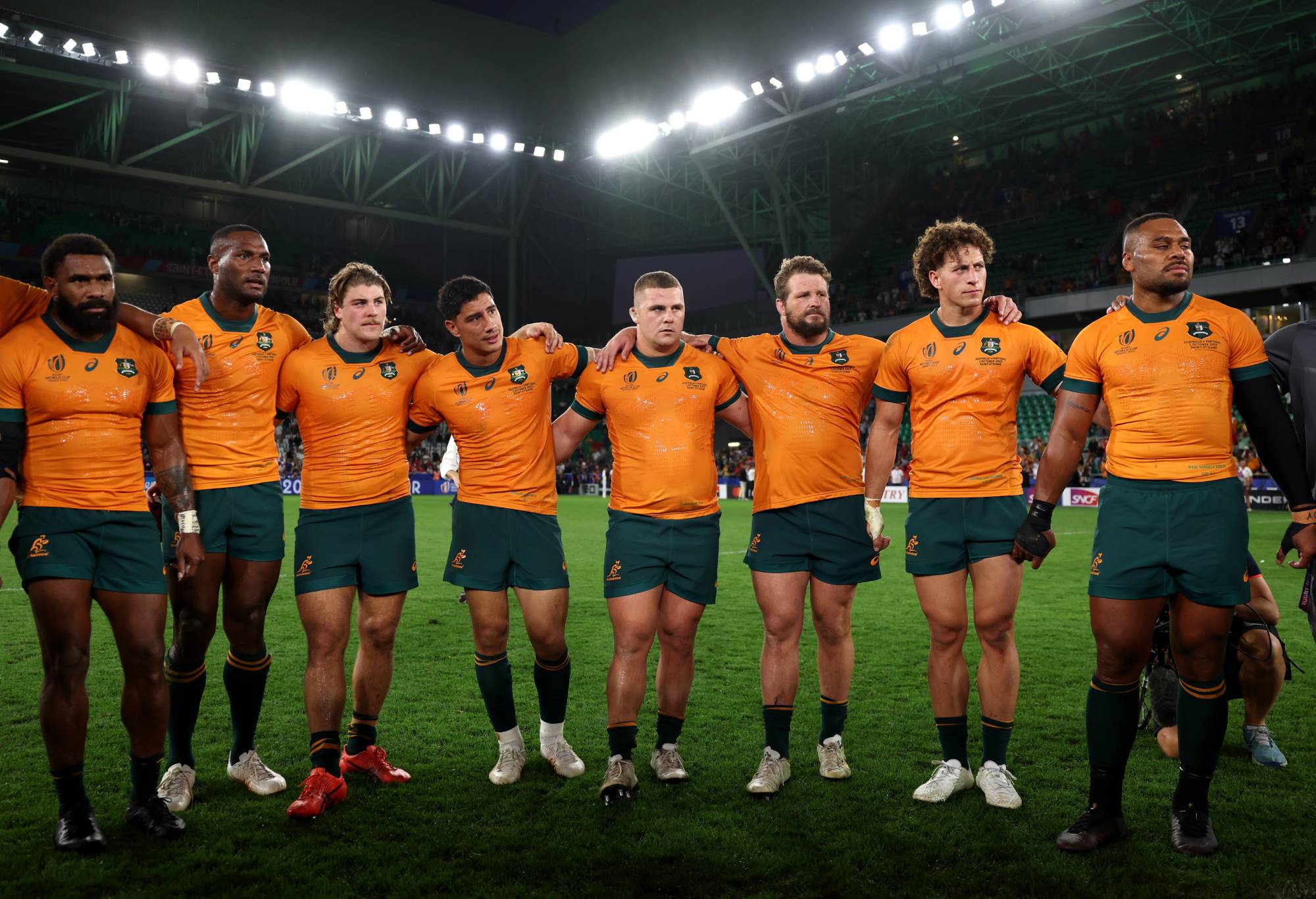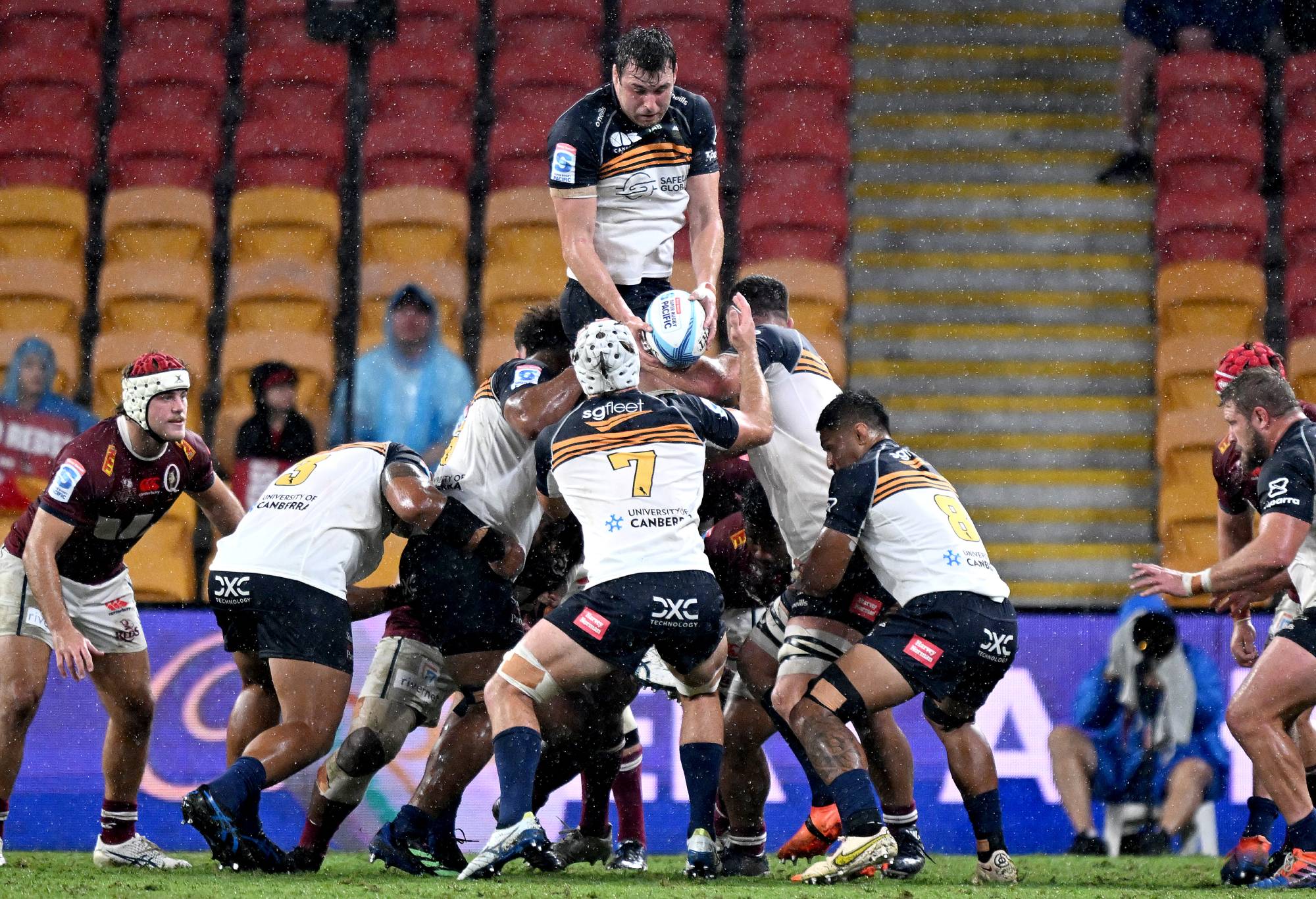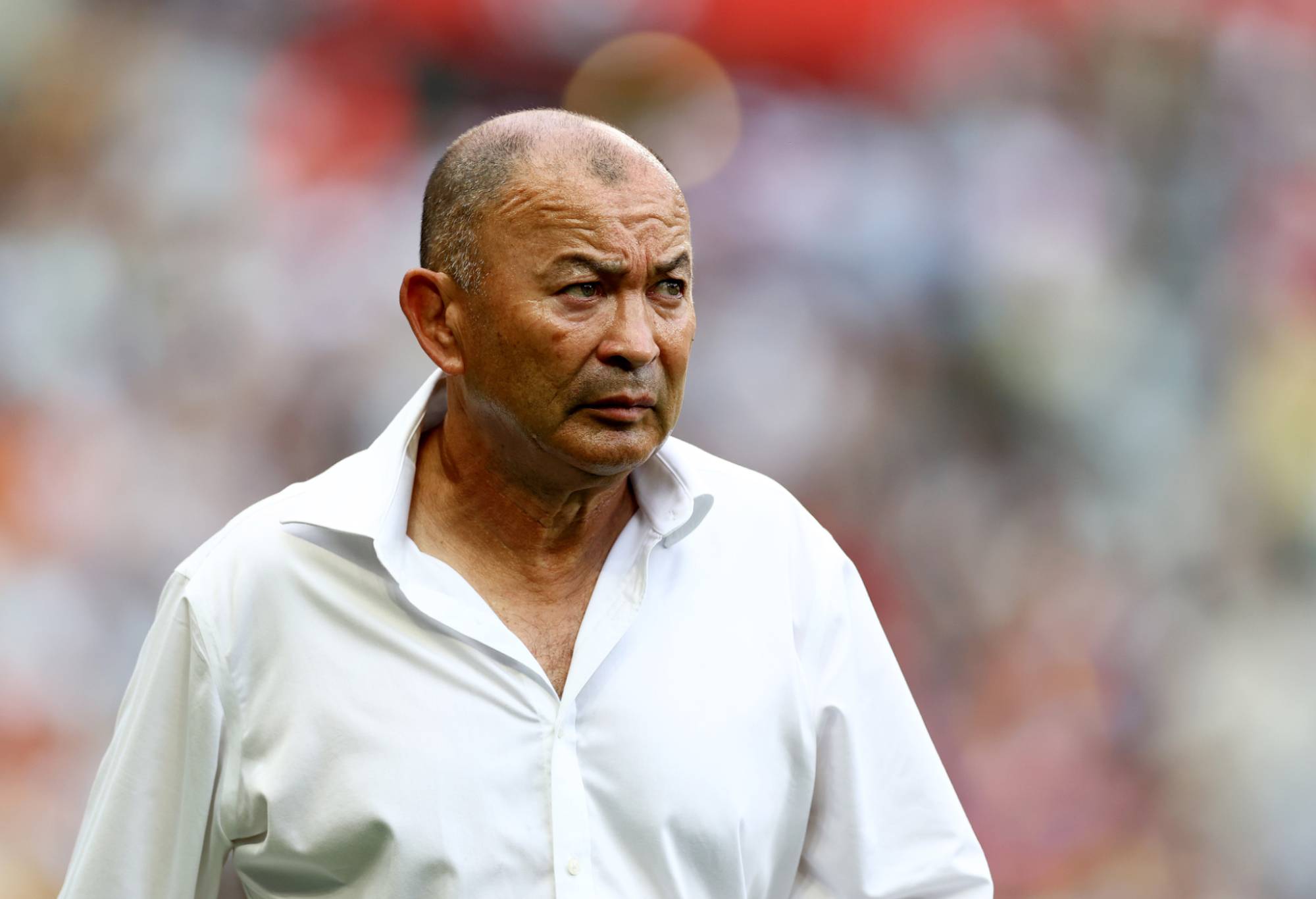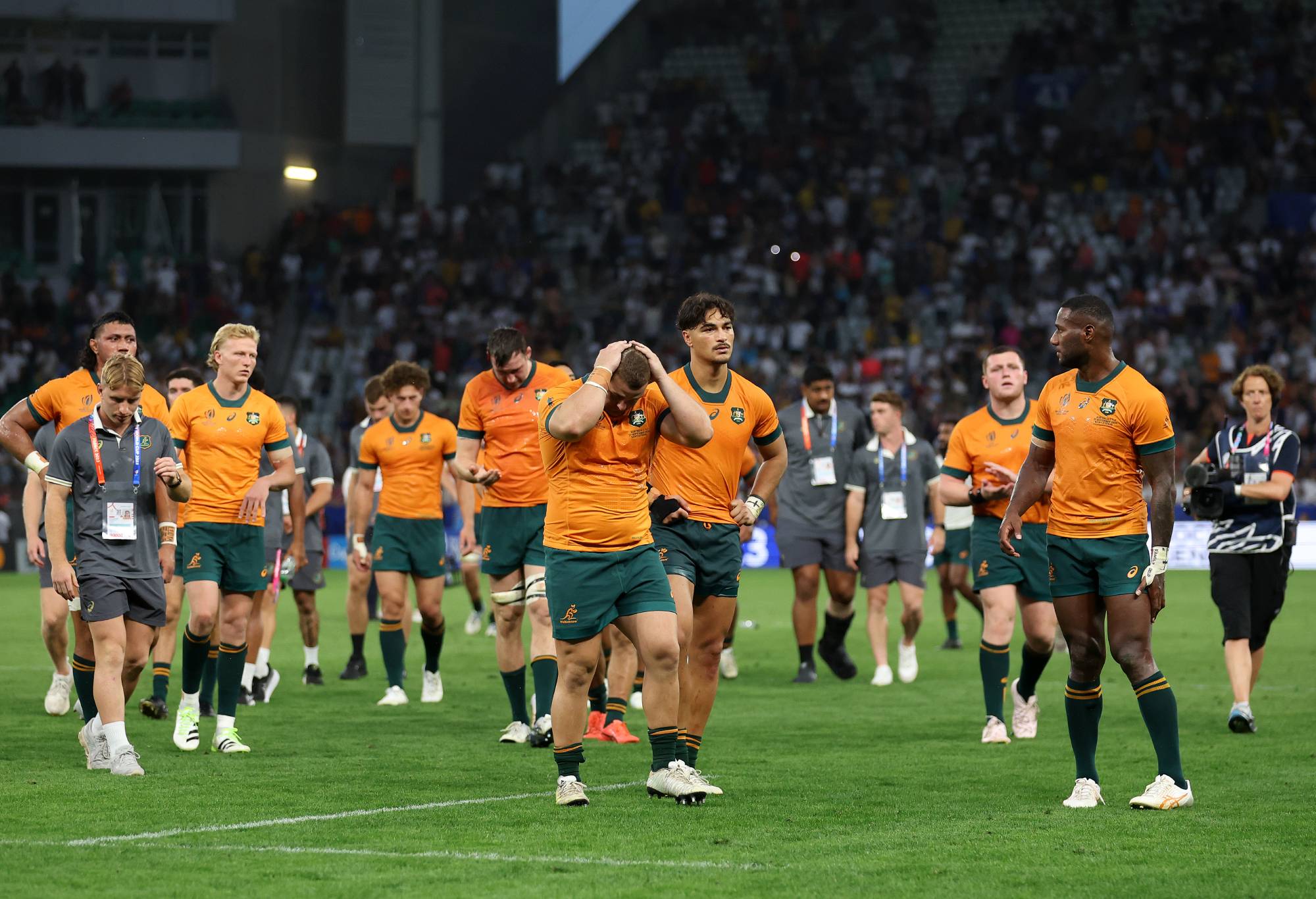WATCH: Marika Koroibete's Jonah Lomu-like run flattens Japanese rugby opponent in semifinal
The Wallabies winger went straight over the top of his rival in Wild Knights 20-17 win over Canon Eagles - with a play that…
As we approach the conclusion of what can only be described as Australian rugby’s annus horribilis, the age-old phrase comes to mind that ‘those who forget the past are condemned to repeat it.’
Reminiscing upon the leadup to the 2019 Rugby World Cup, there’s an uncomfortably familiar sense of déjà vu for followers of the 2023 iteration.
Patchy Super Rugby performances – invariably highlighted by the odd rays of hope from Canberra – preceded inconsistent performances by the Wallabies. Individual stars seemed to generally underwhelm in skills and nous at both levels. You could almost set your watch to the lament of the national coach that players would arrive at camp lacking the fitness to compete.
In contrast, players plying their trade overseas seemed to experience otherworldly growth in ability upon leaving domestic shores, often leading to the outcry, ‘If only we could repatriate the recently expatriated!’
Selections were never to anyone’s satisfaction. Those with short memories might forget that the Wallabies tried three different flyhalves within the pool stages in 2019. There was a feeling that we never quite knew what our best 15 was, let alone our best 23.
Fast-forward four years.

The Wallabies after their World Cup win over Portugal. (Photo by Chris Hyde/Getty Images)
You can change some names. You can certainly add more colour to the last ten months. But sadly, we’ve taken a four-year detour to end up back at the same place, just with a few more kilometres and bumps on the car.
I have felt a lot of emotion over the last few weeks, if not months. It’s the foolishness of supporting a sports team that means the Monday mood at work is influenced by what happened on a patch of grass across 80 minutes between 30 individuals – all of whom are essentially strangers, but 15 of whom we pretend are ours.
That emotion has taken the form of anger, sadness, frustration, depression and simple bewilderment.
There’s plenty of things – and people – to lash out at. However, in my rational moments, I ask myself where should I actually direct my discontent.
Let’s start with Eddie Jones.
I supported the decision to bring him in.
Don’t get me wrong – I liked Dave Rennie. I thought he was a good coach and a decent man who was a good ambassador for the game and the Wallabies. I also didn’t think Rennie’s record was reflective of his ability. I think the influence of a national coach is considerably overshadowed by the system that is producing the players in their squad.
But I didn’t see the harm in bringing Eddie in. He’s a successful coach and, if we could get the systems in place, I thought there will be no one better to promote a successful Wallabies team with a home World Cup on the horizon.
The optimism around his arrival only reassured me that we had done the right thing.

The ACT Brumbies are one of the few reliable Australian Super Rugby teams. (Photo by Bradley Kanaris/Getty Images)
In the months that followed, those familiar feelings came back. Super Rugby teams generally underwhelmed, except for the Brumbies and a few one-off performances of note. The first few Wallaby squads piqued interest, primarily due to the fact that it seemed that Eddie was unsure who was in the frame for matchday selection. Players showing up to Camp Wallaby had to be put through torturous fitness sessions.
Outside of the perennial optimism that sports fans subject themselves to, this was a movie with a familiar ending.
So when Eddie says that he should not be held responsible for the decline of Australian Rugby, I believe him.
I’d even go so far as to say that there’s a very uncomfortable alternative universe in which Rennie saw out his time and we still exited the World Cup without a game being played in October. If we are not prepared to confront this alternative reality, then I dare say that we are in danger of missing the lessons of the last decade (or more).
Eddie may be right about this. But that doesn’t mean we need to accept his implicit characterisation of himself as a martyr with a just cause. He wants us to believe that because A is true, then B must necessarily follow.
Maybe Eddie was just wrong about the solution.
Of course, there has been much ink spilled on the selection of such an inexperienced squad. But I also wonder about some of Eddie’s other observations – a classic example was when he assured us that ‘possession rugby’ was dead, but then we watched some wonderful tests that showed there are multiple ways of playing the game.

Eddie Jones. (Photo by Chris Hyde/Getty Images)
One also has to wonder why he paid lip service to the ‘cohesion’ theory of the likes of Ben Darwin, but seemed to go out of his way to avoid picking or building the very combinations that are at the heart of the theory.
So when Eddie tells us that he was willing to make the change that is necessary, intuitively this sounds good. However, I’m not convinced that the only solution is Eddie’s.
Which brings me to Rugby Australia.
Similar to Jones, I actually believe that people like Hamish McLennan and Phil Waugh genuinely want to make change that will improve the Wallabies.
But the main frustration I feel is a lack of transparency – and, yes, accountability.
While proclaiming the second coming of Eddie, and even backing him in on a five-year rejuvenation project, Rugby Australia knew that they had promised cheques they couldn’t cash. Given what we know about Eddie’s contract now in relation to private equity and governance reform, it’s hard to accept that Rugby Australia were not talking with forked tongue when they said they weren’t concerned that Eddie had flagged that he would be leaving after the World Cup on a podcast in the middle of the year.
Accountability would suggest it would be good for McLennan or Waugh to admit that it was a mistake to sign Eddie on the proviso that they would be able to usher through governance reform and obtain private equity. You would have better luck getting a Qantas flight on time.
In fact, it worries me that Eddie spoke frequently about the need for better ‘talent identification’. It seems to me that the talent identified by most Australian provinces conveniently seems to be underwhelming, but the talent identified by other systems seems to be so good.
While this may be good for the catharsis of Australian rugby fans, it still does not address what is next. Perhaps the worst mistake that could come from this year would be for Rugby Australia to use Eddie as the scapegoat to be sent to the wilderness, with no further action necessary.
And this is where transparency comes in.
Eddie tells us that he wanted money and ‘alignment’. Frankly, I’m glad that we weren’t able to obtain the former because my suspicion is that Eddie (and McLennan) would have used a decent chunk on securing the services of players in the NRL.
The latter issue of ‘alignment’ or ‘centralisation’ is where Rugby Australia could rebuild some burnt bridges with the public. These are good buzzwords, but there is no transparency about what this means.
I don’t think anyone would say they are anti-alignment. However, we do not know what clubs are being asked to do. We also don’t know how it will impact the Wallabies.
Are we simply saying that there will be a national standard whereby anyone with a Wallabies contract has to practice 50 passes a week?

The Wallabies react after losing to Fiji at the Rugby World Cup. (Photo by Catherine Ivill/Getty Images)
Central contracting is held up as best practice. However, there is minimal detail about how this works. Does this mean Rugby Australia can move Tate McDermott to the Rebels to build a combination with Carter Gordon through Super Rugby?
Fans might get uneasy about this potential outcome if you tell them this might be what happens. However, I can assure you that they will be even more uneasy if you don’t tell them, and you do it anyway.
Not only has this reform been handled in the most opaque way possible, but they now have set off a PR nightmare by allowing the Brumbies to suggest that Rugby Australia is undertaking a corporate hostile takeover with the intent of destroying a system that seems to be an asset.
Like Eddie, Rugby Australia could be developing a cure that is worse than the disease.
I think many Australian rugby fans would have a similar view that it may have been preferable if Craig Joubert had not awarded us that infamous penalty that allowed us to progress ultimately to a World Cup Final in 2015.
It is worth remembering that, if not for that outcome, the Wallabies last five results at the World Cup would have been: 2007 – QF exit, 2011 – SF exit, 2015 – QF exit, 2019 – QF exit, 2023 – pool exit.
This is not a sudden problem. And I don’t think anyone in Australian rugby believes that results will change without systemic change.
The easy option is to rely on a coaching change, a marquee signing or two, and the perennial optimism of Australian rugby fans.
The meaningful option is going to require some accountability and then much better transparency. Fans want to believe again – you only have to look at the way they embraced Eddie on his return. However, they shouldn’t be taken for mugs.
Many will rightfully argue that Rugby Australia shouldn’t waste this crisis. It must bring about change.
All that the fans want is to be brought in and brought along.